

Lawyer assesses Pinterest's copyright situation. In All This Talk Of Pinterest And Copyright, The Fact That It's Driving Massive Traffic Seems Important. Pinterest - Our View of this Project. PDF | Print | E-mail Friday, 24 February 2012 13:29 Pinterest - three reasons for not using it There has been a vast amount of internet chatter about Pinterest of late in which both those in favour of and against this latest user driven content website have given their views.
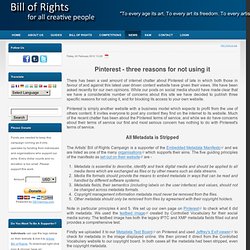
We have been asked recently for our own opinions. While our posts on social media should have made clear that we have a considerable number of concerns about this site we have decided to publish three specific reasons for not using it, and for blocking its access to your own website. Pinterest and copyright. Pinterest, in case you have not heard, is the latest social network.
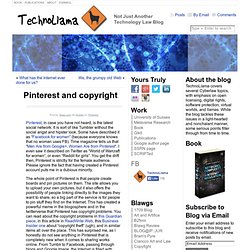
It is sort of like Tumbler without the social angst and hipster look. Some have described it as “Facebook for women” (because everyone knows that no woman uses FB). Copyright Law a Story From the Ancient Times. ALl rights open to share and credit the happy author Update 07/01/2013: Pinterest sued over copyright infringement Yesterday, on my way comuting home, I could catch up with one of my favorites podcasts, This Week in Law by Denise Howell.
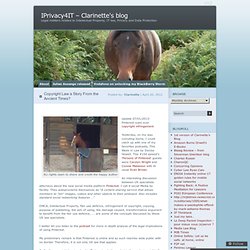
This #154 episod’s ‘Persons of Pinterest‘ guests were Carolyn Wright and Connie Mableson with th usual Evan Brown An interesting discussion between US specialists attorneys about the new social media platform Pinterest. I call it social Media by facility. Pinterest & Copyright.
For Those Freaking Out Over Pinterest's Terms Of Service, Have You Stopped Using Every Other Internet Site Yet? Video Embedding Site Isn't a Contributory Copyright Infringer, But Sideloading Could Be Direct Infringement. By Eric Goldman Flava Works, Inc. v.
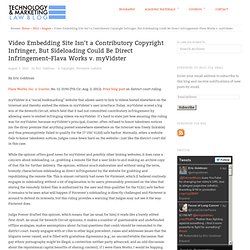
Gunter, No. 11-3190 (7th Cir. Aug. 2, 2012). Prior blog post on district court ruling. myVidster is a “social bookmarking” website that allows users to link to videos hosted elsewhere on the Internet and thereby embed the videos in myVidster’s user interface. While the opinion offers good news for myVidster and possibly other linking websites, it does raise a concern about sideloading, i.e., grabbing a remote file that a user links to and making an archive copy of that file for further delivery. Judge Posner drafted this opinion, which means that (as usual for him) it reads like a barely edited first-draft.
The main ruling is that the folks uploading infringing videos are direct infringers, but myVidster isn’t contributorily liable for letting users link to those infringing videos. Posner does separately address the 106 public performance right, but I found the opinion about that especially inscrutable. This opinion is not an instant classic. Pinterest and Copyright: So Why All the Fuss? Part 2 (of 2): Welcome Nice Pinterest Users to the Bizarro World of Copyright and the Internet!

Last time, we took stock of the recent kerfuffle about Pinterest, copyright and Pinterest’s Terms of Use (“TOU”), and we even looked at those horrifying, normal TOU. In this post, I want to step back and answer two basic questions: Should Pinterest users really worry about being sued for copyright infringement? And is there really something to all this fuss? I’ll preface the rest of what I’m going to say by emphasizing that, although I’m a lawyer in this field (i.e., copyright and the internet), I’m not giving you legal advice here. Why deleting your Pinterest boards over copyright concerns is an overreaction – Lex Technologiae. Kirsten Kowalski of DDK Portraits wrote a blog post about why she “tearfully” took down her Pinterest boards.
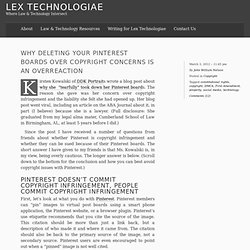
The reason she gave was her concern over copyright infringement and the liability she felt she had opened up. Her blog post went viral, including an article on the ABA Journal about it, in part (I believe) because she is a lawyer.
STUDY: Pinterest Tops Facebook In Shopping Engagement. As Facebook enters the ecommerce game, a new study shows that it still has work to do to catch up with Pinterest.
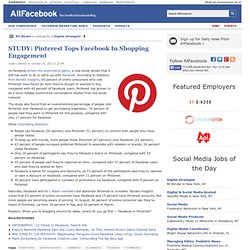
According to statistics from Bizrate Insights, 69 percent of online consumers who visit Pinterest have found an item they’ve bought or wanted to buy, compared with 40 percent of Facebook users. Pinterest has proven to be a more reliable ecommerce conversation starter than the social network. Worries Over Copyright Infringement Kept Warren's Senate Campaign Off Pinterest. Senator-elect Elizabeth Warren's 2012 campaign stayed away from the social image-sharing platform Pinterest because the campaign's new media director feared that the platform could be shut down by copyright infringement claims.
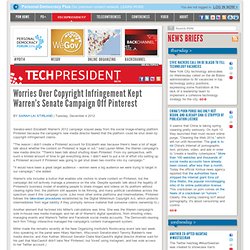
"The reason I didn’t create a Pinterest account for Elizabeth was because there’s been a lot of legal talk about whether the content on Pinterest is legal or not," said Lauren Miller, the Warren campaign's new media director. "There’s been talk about shutting down Pinterest. From my perspective, with such a limited amount of time to get everything done, I didn’t want to put a lot of effort into setting up a Pinterest account if Pinterest was going to get shut down two months into my campaign.
" "It would have been a great target audience – women were a big audience we were trying to target in our campaign," she added. Another element that factored into Miller's calculations was time. Pinterest: We don't want to sell your images, never have. It invoked the ire of content owners and put many users off the service but today Pinterest has announced that it will no longer have the right the sell images users place on the site.
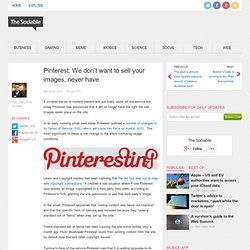
In an early morning email sent today Pinterest outlined a number of changes to its Terms of Service (ToS), which will come into force on April 6, 2012. The most significant of these is the change to the site’s confusing usage conditions. Users and copyright holders had been claiming that the old ToS was out of step with copyright conventions. It created a odd situation where if one Pinterest user posted an image copyrighted to a third party they were, according to Pinterest’s ToS, granting the site permission to sell that third party’s image. In the email, Pinterest explained that “selling content was never our intention” and that the specific Term of Service was included because they “used a standard set of Terms” when they set up the site.
Partnership: the Canadian Journal of Library and Information Practice and Research. Abstract Pinterest, a pinboard-style social photo-sharing website, has become a popular site for many individuals who collect images that help them plan, organize, and explore any topic of interest.
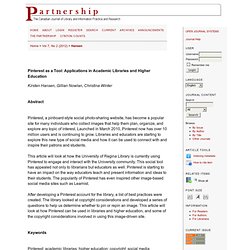
Launched in March 2010, Pinterest now has over 10 million users and is continuing to grow. Libraries and educators are starting to explore this new type of social media and how it can be used to connect with and inspire their patrons and students. This article will look at how the University of Regina Library is currently using Pinterest to engage and interact with the University community. This social tool has appealed not only to librarians but educators as well. Copyright Infringement and the Second Generation of Social Media Websites: Why Pinterest Users Should Be Protected from Copyright Infringement by the Fair Use Defense by Craig Carpenter. Early social media platforms have evolved into a new generation of online information-sharing. The focus of social media is shifting from user-created content to user-found content.
This trend is shared by new versions of the original social media powerhouses and recent social media start-ups. For example, both Twitter and Facebook have made it easier for users to integrate photos and videos from the internet into their profiles. Additionally, new “second generation” social media platforms have expanded on this trend by focusing almost entirely on found content — especially pictures. ARTICLE: Copyright and Social Media: A Preliminary Case Study of Pinterest.
I. Introduction: Where Social Media and Copyright Meet Social media fills our lives in ways unimaginable less than a decade ago. 1 For the whole of copyright history since the invention of the printing press, we were static observers of the world - consumers of culture. Now, we have now become active participants in making and distributing culture. 2 It is a user-generated revolution of proportions we have only begun to explore. 3 In short, Web 2.0 is thrilling and, for copyright law, presents unprecedented questions and changes. 4 "Web 2.0" was a term coined by Tim O'Reilly and Dale Dougherty to describe a new post-dot-com-bubble phenomenon. 5 The Internet had suddenly become more interactive rather than static.
Is Pinterest a Haven for Copyright Violations? Pinterest's terms of use state that if you upload content to Pinterest, then you're giving Pinterest permission to distribute, sublicense, and sell that content: By making available any Member Content through the Site, Application or Services, you hereby grant to Cold Brew Labs a worldwide, irrevocable, perpetual, non-exclusive, transferable, royalty-free license, with the right to sublicense, to use, copy, adapt, *modify, distribute, license, sell, transfer, publicly display, publicly perform, transmit, stream, broadcast, access, view, and otherwise exploit such Member Content only on, through or by means of the Site, Application or Services. What You Should Know About Pinterest and Copyright.
Content-sharing site Pinterest has been surging in popularity. The bigger it gets, the more responsibility it has to ensure that copyrighted content doesn't show up on its site. Less than a week after Pinterest offered an opt-out code for websites seeking to protect their content, Flickr is adopting that code to help users protect copyrighted images on its photo-sharing network. If you're fitting Pinterest into your company's marketing plans, or seeking to protect your content from eager Pinterest users, what should you do?
Pinterest: A Copyright Nightmare? Lawyer assesses Pinterest's copyright situation. Pinterest addresses copyright concerns. A Lawyer Who Is Also A Photographer Just Deleted All Her Pinterest Boards Out Of Fear. Pinterest Problem: Users May Run Into Copyright Issues. Get Breaking News First Receive News, Politics, and Entertainment Headlines Each Morning. Sign Up. Pinterest continues to address copyright issues and adds Flickr attribution. Copyright. Pinterest ("Pinterest") respects the intellectual property rights of others and expects its users to do the same. It is Pinterest's policy, in appropriate circumstances and at its discretion, to disable and/or terminate the accounts of users who repeatedly infringe or are repeatedly charged with infringing the copyrights or other intellectual property rights of others. In accordance with the Digital Millennium Copyright Act of 1998, the text of which may be found on the U.S.
Pinterest Copyright Issues Could Spur Changes To Terms Of Use And ‘Pin Etiquette’ The Copyright Question: How to Protect Yourself on Pinterest. Gonzalo E. Mon is a partner in the Advertising Law practice at Kelley Drye & Warren LLP and his co-author, John J. Heitmann, is a partner in the firm’s Telecommunications group. Read more on Kelley Drye’s advertising blog, Ad Law Access, or keep up with the group on Facebook or Twitter. A Timeline of Intellectual Property Issues on Pinterest. Delicious. In Shift, Pinterest Says to Pin Your Own Stuff. Is Pinterest the Next Napster?
Pinterest / Home. This WEEK in LAW 154.